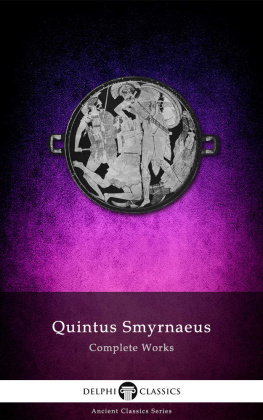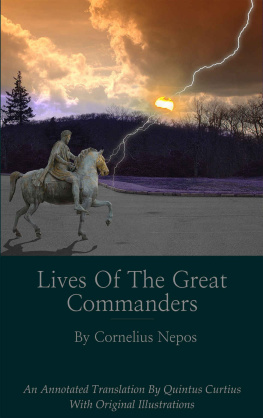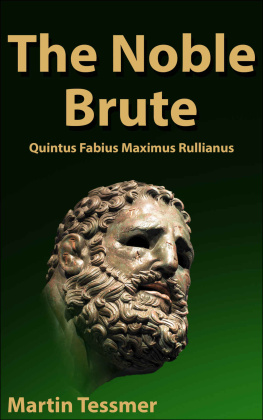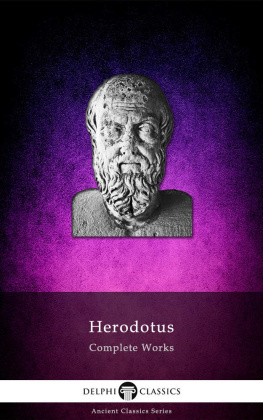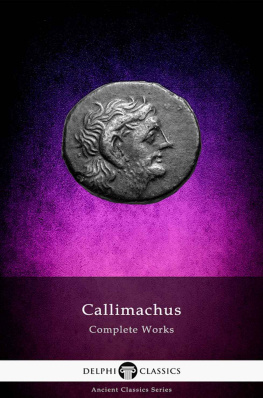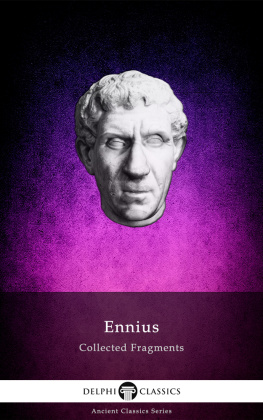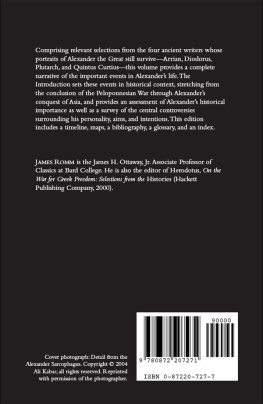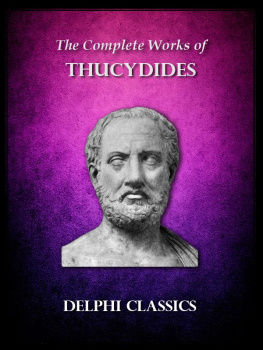Quintus Smyrnaeus - Delphi ancient classics: complete works of quintus smyrnaeus
Here you can read online Quintus Smyrnaeus - Delphi ancient classics: complete works of quintus smyrnaeus full text of the book (entire story) in english for free. Download pdf and epub, get meaning, cover and reviews about this ebook. year: 2014, publisher: Delphi Classics, genre: Science. Description of the work, (preface) as well as reviews are available. Best literature library LitArk.com created for fans of good reading and offers a wide selection of genres:
Romance novel
Science fiction
Adventure
Detective
Science
History
Home and family
Prose
Art
Politics
Computer
Non-fiction
Religion
Business
Children
Humor
Choose a favorite category and find really read worthwhile books. Enjoy immersion in the world of imagination, feel the emotions of the characters or learn something new for yourself, make an fascinating discovery.
- Book:Delphi ancient classics: complete works of quintus smyrnaeus
- Author:
- Publisher:Delphi Classics
- Genre:
- Year:2014
- Rating:4 / 5
- Favourites:Add to favourites
- Your mark:
- 80
- 1
- 2
- 3
- 4
- 5
Delphi ancient classics: complete works of quintus smyrnaeus: summary, description and annotation
We offer to read an annotation, description, summary or preface (depends on what the author of the book "Delphi ancient classics: complete works of quintus smyrnaeus" wrote himself). If you haven't found the necessary information about the book — write in the comments, we will try to find it.
Delphi ancient classics: complete works of quintus smyrnaeus — read online for free the complete book (whole text) full work
Below is the text of the book, divided by pages. System saving the place of the last page read, allows you to conveniently read the book "Delphi ancient classics: complete works of quintus smyrnaeus" online for free, without having to search again every time where you left off. Put a bookmark, and you can go to the page where you finished reading at any time.
Font size:
Interval:
Bookmark:
The Complete Works of
QUINTUS SMYRNAEUS
(fl. 4 th century AD)

Contents

Delphi Classics 2014
Version 1

The Complete Works of
QUINTUS SMYRNAEUS

By Delphi Classics, 2014
Complete Works of Quintus Smyrnaeus
First published in the United Kingdom in 2014 by Delphi Classics.
Delphi Classics, 2014.
All rights reserved. No part of this publication may be reproduced, stored in a retrieval system, or transmitted, in any form or by any means, without the prior permission in writing of the publisher, nor be otherwise circulated in any form other than that in which it is published.
Delphi Classics
is an imprint of
Delphi Publishing Ltd
Hastings, East Sussex
United Kingdom
Contact: sales@delphiclassics.com
www.delphiclassics.com

The Agora at Smyrna (modern day zmir, Turkey) Quintus birthplace

More ruins at Smyrna
Translated by Arthur Sanders Way
Very little is known of the life of Quintus of Smyrnaeus, who is traditionally placed in the latter part of the 4th century AD. Some scholars have suggested that his epic poem Posthomerica , which follows on from Homers narration of the Trojan War, dates from an earlier date in the 3rd or even the 2nd century, as the text reveals influences from the Second Sophistic, a school of Greek orators that flourished in previous centuries. According to Quintus own account (XII. 310), he began composing poetry in his early youth while tending sheep near Smyrna (present-day zmir in Turkey).
The Posthomerica is composed of fourteen books and spans the period between the end of Homers Iliad and the conclusion of the Trojan War. The primary importance of Quintus epic is its status as the earliest surviving work to cover this period of the myth, since the archaic works in the Epic Cycle that he drew upon are now lost. Quintus borrows from the same cyclic poems from which Virgil also drew, in particular the Aethiopis (Coming of Memnon), as well as the Iliupersis (Destruction of Troy) of Arctinus of Miletus and the Ilias Mikra (Little Iliad) of Lesches. The Posthomerica is closely modelled on Homer in style, though, of course, Quintus is widely acknowledged to be a lesser poet than his predecessor.
The first four books, which concern the same events as the Aethiopis of Arctinus of Miletus, describe the heroic deeds and deaths of Penthesileia the Amazon, of Memnon the leader of the Ethiopians, who is slain by Achilles, and of Achilles himself and the funeral games held in his honour. Books five to twelve feature many of the events that were narrated in the lost Little Iliad of Lesches, including the contest between Aias and Odysseus for the arms of Achilles, the death of Aias, the exploits of Neoptolemus, Eurypylus and Deiphobus, the deaths of Paris and Oenone and the construction of the wooden horse. The remaining books concern events related in Arctinus The Sack of Troy , telling of the capture of Troy by means of the wooden horse, the sacrifice of Polyxena at the grave of Achilles, the departure of the Greeks and their dispersal by storm.

The Fall of Troy by Johann Georg Trautmann, c. 1760

The sacrifice of Polyxena by the triumphant Greeks, as depicted on an Attic black-figure Tyrrhenian amphora, c. 570 BC
Homers Iliad begins towards the close of the last of the ten years of the Trojan War: its incidents extend over some fifty days only, and it ends with the burial of Hector. The things which came before and after were told by other bards, who between them narrated the whole cycle of the events of the war, and so were called the Cyclic Poets. Of their works none have survived; but the story of what befell between Hectors funeral and the taking of Troy is told in detail, and well told, in a poem about half as long as the Iliad. Some four hundred years after Christ there lived at Smyrna a poet of whom we know scarce anything, save that his first name was Quintus. He had saturated himself with the spirit of Homer, he had caught the ring of his music, and he perhaps had before him the works of those Cyclic Poets whose stars had paled before the sun.
We have practically no external evidence as to the date or place of birth of Quintus of Smyrna, or for the sources whence he drew his materials. His date is approximately settled by two passages in the poem, viz. vi. 531 sqq., in which occurs an illustration drawn from the man-and-beast fights of the amphitheatre, which were suppressed by Theodosius I. (379-395 A.D.); and xiii. 335 sqq., which contains a prophecy, the special particularity of which, it is maintained by Koechly, limits its applicability to the middle of the fourth century A.D.
His place of birth, and the precise locality, is given by himself in xii. 308-313, and confirmatory evidence is afforded by his familiarity, of which he gives numerous instances, with many natural features of the western part of Asia Minor.
With respect to his authorities, and the use he made of their writings, there has been more difference of opinion. Since his narrative covers the same ground as the Aethiopis (Coming of Memnon) and the Iliupersis (Destruction of Troy) of Arctinus (circ. 776 B.C.), and the Little Iliad of Lesches (circ. 700 B.C.), it has been assumed that the work of Quintus is little more than an amplification or remodelling of the works of these two Cyclic Poets. This, however, must needs be pure conjecture, as the only remains of these poets consist of fragments amounting to no more than a very few lines from each, and of the summaries of contents made by the grammarian Proclus (circ. 140 A.D.), which, again, we but get at second-hand through the Bibliotheca of Photius (ninth century). Now, not merely do the only descriptions of incident that are found in the fragments differ essentially from the corresponding incidents as described by Quintus, but even in the summaries, meagre as they are, we find, as German critics have shown by exhaustive investigation, serious discrepancies enough to justify us in the conclusion that, even if Quintus had the works of the Cyclic poets before him, which is far from certain, his poem was no mere remodelling of theirs, but an independent and practically original work. Not that this conclusion disposes by any means of all difficulties. If Quintus did not follow the Cyclic poets, from what source did he draw his materials? The German critic unhesitatingly answers, from Homer. As regards language, versification, and general spirit, the matter is beyond controversy; but when we come to consider the incidents of the story, we find deviations from Homer even more serious than any of those from the Cyclic poets. And the strange thing is, that each of these deviations is a manifest detriment to the perfection of his poem; in each of them the writer has missed, or has rejected, a magnificent opportunity. With regard to the slaying of Achilles by the hand of Apollo only, and not by those of Apollo and Paris, he might have pleaded that Homer himself here speaks with an uncertain voice (cf. Iliad xv. 416-17, xxii. 355-60, and xxi. 277-78). But, in describing the fight for the body of Achilles (Odyssey xxiv. 36 sqq.), Homer makes Agamemnon say:
Next pageFont size:
Interval:
Bookmark:
Similar books «Delphi ancient classics: complete works of quintus smyrnaeus»
Look at similar books to Delphi ancient classics: complete works of quintus smyrnaeus. We have selected literature similar in name and meaning in the hope of providing readers with more options to find new, interesting, not yet read works.
Discussion, reviews of the book Delphi ancient classics: complete works of quintus smyrnaeus and just readers' own opinions. Leave your comments, write what you think about the work, its meaning or the main characters. Specify what exactly you liked and what you didn't like, and why you think so.

